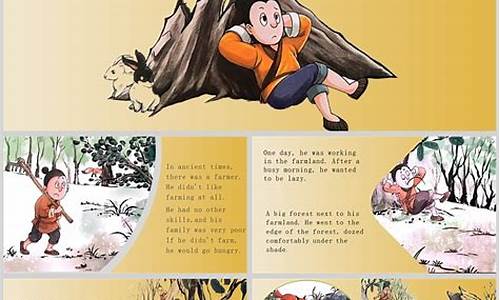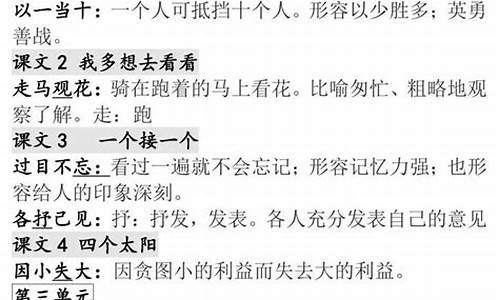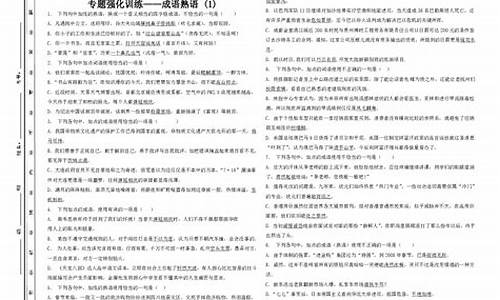您现在的位置是: 首页 > 成语查询大全 成语查询大全
中国成语故事英文版短_中国成语故事英文版短篇带翻译
ysladmin 2024-06-21 人已围观
简介中国成语故事英文版短_中国成语故事英文版短篇带翻译 您好,很高兴能为您介绍一下中国成语故事英文版短的相关问题。我希望我的回答能够给您带来一些启示和帮助。1.?й???
您好,很高兴能为您介绍一下中国成语故事英文版短的相关问题。我希望我的回答能够给您带来一些启示和帮助。
1.?й????????Ӣ?İ??
2.成长必读:中国成语故事27(盘根错节,抛砖引玉
3.求中国传统文化的历史经典故事、民间传说、成语故事的英语改编。
4.谁可以帮忙用西班牙语翻译一个中国的成语故事啊,比如邯郸学步、刻舟求剑之类的,谢谢
5.中国传统文化的历史经典故事、民间传说、成语故事的英语改编

?й????????Ӣ?İ??
给你个博客网址,上面有很多。
/blog/chaney/blogview.asp?logID=8694&cateID=1243
拔苗助长
To Pull up the Seedlings to Help Them Grow
宋国有个人担心自己的 秧苗 长得太慢。于是他把一颗颗秧苗拔长了些。然后 疲惫 的回了家。 " 今天我可累坏了,我帮助秧苗长长了! " 。他对家人说。 他的儿子 急忙 跑到田里去看看是怎么回事。他发现所有的秧苗都 枯萎 了。 《孟子》
A man of the state of Song was worried about his seedlings growing too slowly. He pulled up the seedlings one by one and came home exhaustedly." I am tired out today. I helped the seedlings grow," he said to his family. His son hurried to the fields to have a look and found that all the seedlings had shriveled up. Mencius
词汇:
1 秧苗 yāng miáo 农作物的幼苗
seedling
2 疲惫 pí bèi 很累
exhaustedly
3 急忙 jí máng 心里着急,行动加快
hurry
4 枯萎 kū wěi 干枯萎缩
shrivel up
成语故事
中国古时候宋朝有一个很幽默的人,他叫孙山。有一年他去参加考试,公布名单时他是最后一名。回到家,他的邻居向他打听自己的儿子考得怎么样。孙山笑着对邻居说:“孙山考了最后一名,你儿子的名字还在孙山的后面呢。”
In the Song Dynasty there was a joker called Sun Shan. One year he went to take the imperial examination, and came bottom of the list of successful candidates. Back in his hometown, one of his neighbor asked him whether the neighbor's son had also passed. Sun Shan said, with a smile:"Sun Shan was the last on the list. Your son came after Sun Shan."
成长必读:中国成语故事27(盘根错节,抛砖引玉
1 揠苗助长 :比喻急于求成反而于事无成。
春秋时期,宋国有一个农夫,他总是嫌田里的庄稼长得太慢。 于是,他来到田里,把禾苗一棵一棵地往上拔。第二天,他发现田里的禾苗全都已经枯死了。
2 乘风破浪:形容不怕困难,奋勇前进的精神
古代南北朝的时候,宋国有位将军姓宗名悫,他从小就很勇敢,也很有抱负。有一天,宗悫的叔父问他有什么志向,宗悫回答道:“愿乘长风,破万里浪。”宗悫经过勤学苦练,努力奋斗,终于成为一位能征善战的将军。
3 一衣带水:比喻只隔了一条狭窄水域的,靠得非常近的两地
南北朝的时候,北方的北周和南方的陈国以长江为界。
北周的宰相杨坚,废了周静帝,自己当皇帝,建立了隋朝。
他决心要灭掉陈国,曾说:“我是全国老百姓的父母,难道能因为有一条像衣带那样窄的长江隔着,就看着南方百姓受苦而不拯救他们吗? “
求中国传统文化的历史经典故事、民间传说、成语故事的英语改编。
成语: 盘根错节
拼音: pán gēn cuò jié
解释: 盘:盘曲;错:交错;节:枝节。树木的根枝盘旋交错。比喻事情纷难复杂。
出处: 《后汉书·虞诩传》:“志不求易,事不避难,臣之职也;不遇盘根错节,何以别利器乎?”
举例造句: 莫谓乡村阻力多,盘根错节须能手。 ★徐特立《毕业歌》
拼音代码: pgcj
近义词: 错综复杂、根深蒂固
反义词: 简明扼要
歇后语: 千年的大树;野花树长在石崖上
灯谜: 五百年前的老槐树
用法: 作谓语、宾语、定语;比喻事情复杂
英文: with twisted roots and gnarled branches
故事: 东汉读书人虞诩应太尉李修的聘请为官,西羌突然入侵,他与大将军邓骘的用兵存在分歧而产生矛盾。邓后来找机会报复性调他去朝歌任职。虞诩则认为这是好事,就像砍树应砍那些坚硬的盘根错节,这样才显出斧头的锋利
成语: 抛砖引玉
拼音: pāo zhuān yǐn yù
解释: 抛出砖去,引回玉来。比喻用自己不成熟的意见或作品引出别人更好的意见或好作品。
出处: 宋·释道原《景德传灯录》卷十:“比来抛砖引玉,却引得个坠子。”
举例造句: 刚才婢子费了唇舌,说了许多书名,原是抛砖引玉,以为借此长长见识,不意竟是如此! ★清·李汝珍《镜花缘》第十八回
拼音代码: pzyy
近义词: 引玉之砖、一得之见
灯谜: 国
用法: 作谓语、定语、宾语、分句;用于谦词
英文: throw out a brick to attract a jade
故事: 唐朝诗人常建非常佩服赵嘏的才华,总想得到赵嘏的诗作。一次常建打听到赵嘏要到灵岩寺游玩,就先赶到该寺,在墙上题了两句诗。赵嘏见到墙上的诗,提笔就在诗的后面加上两句,形成一首完整的七言绝句,人们评说这是常建抛砖引玉
谁可以帮忙用西班牙语翻译一个中国的成语故事啊,比如邯郸学步、刻舟求剑之类的,谢谢
退避三舍
Retreating about Thirty Miles as Condition For Peace
During the Spring and Autumn Period (770-476 B.C.), Duke Xian of the State of Jin Killed the crown prince Sheng because he had heard slanders about Sheng and believed them. He also sent his men to arrest Chong Er, Shen Sheng and believed them. He also sent his men to arrest Chonh Er, Shen Sheng's brother. Hearing the news, Chong Er escaped from the state of Jin, remaining a fugitive for more than ten years.
After innumerable hardships, Chong Er arrived at the State of Chu at last. King Cheng of the State of Chu treated him with high respect as he would have treated the ruler of a state, believing that he would have a vright fuure.
One day, King Cheng of the State of Chu gave a banquet in honoudr of Chong Er. Suddenly, amid the harmonious atmosphere of drinking and talking, King Cheng of the State of Chu asked Chong Er. "How will you repay me when you return to the State of Jin and become its ruler one day?" After thinking for a moment, Chong Er said, "You have plenty of beauties and attendants as well as jewelry and silk cloth, and the state of Chu abounds in rare brides and animals. What treasure can the State of Jin boast having to present to your majesty?" King Cheng of the State of Chu said, "You are too modest. Nevertheless, you still have to show your gratitude to me in one way or another, I presume?" Smiling, Chong Er answered, "If I should be fortunate enouge to return to the State of Jin and become its ruler, the State of Jin would be friendly to the State of Chu. If, one day, there should be a war between the two states, I would definitely order my troops to retreat three SHE (one SHE is equivalent to thirty LI. The LI is a Chinese unit of length equivalent to 1/2 kilometre. And, therefore, three SHE is about thirty miles.) as a condition for peace. If, under that condition, you were still not reconciled, I would have to fight with you."
Four years later, as might be expected, Chong Er returned to the State of Jin and became its ruler. He was none other than Duke Wen of the State of Jin famous in ancient Chinese history. Ruled by him, the State of Jin became increasingly powerful.
In the year 533 B.C., the Chu troops and the Jin troops confronted each other in a battle. Faithful to his promise, Duke Wen of the State of Jin ordered his troops to retreat about thirty miles. After retreating, the Jin troops were stationed at Chengpu. Seeing that the Jin troops were retreating, the Chu troops thought that the enemy troops were afraid, and began chasing them. Taking advantage of the Chu troops' arrogance and their talking the Jin troops lightly, the Jin troops concentrated their forces and inflicted a crushing defeat on the Chu troops, thus winning the victory of the battle of Chengpu.
This set phrase, "retreating about thirty miles as a condition for peace," is derived from the Chapter "The Twenty-second Year of Duke Xi" in ZuoZhuan, the famous commentary by Zuo Qiuming on The spring and Autumn Annals. The idea of this set phrase is to give way to somebody in order to avoid a conflict.
退避三舍
退缩约三十英里, 在春秋时期(公元前770-476年)的和平条件 ,杜克西安晋国皇太子盛,因为他听说诬蔑盛,并相信他们。他还派他的手下逮捕,沉盛重耳,并相信他们。他还派他的手下逮捕Chonh呃,申生的弟弟。重耳闻讯,逃出了晋国,其余的逃犯十余年。 经过千辛万苦,重耳来到楚国最后。景程的楚国与崇高的敬意,因为他会处理一个国家的统治者对待他,相信,他会有vright fuure。 有一天,景程的楚国设宴招待重耳honoudr 。突然,在一片和谐的气氛中,喝酒和说话,景程的楚国问重耳。“你将如何报答我,当你回到晋国,成为它的统治者吗?” 沉吟了片刻后,重耳说:“你有很多美女和服务员,以及珠宝和丝绸布,楚国盛产罕见的新娘和动物什么珍奇呈现给晋国夸大王呢?“ 楚国的成王说,“你太谦虚了,不过,你仍然有这样或那样的显示您的感谢我,我相信吗?” ,重耳笑着回答,“如果我应该幸运enouge,回到晋国,成为它的统治者,晋国楚是友好国家,假如有一天,应该有之间的战争两种状态,我肯定会命令军队撤退三个SHE(一舍等于三十里。LI是一个长度单位,相当于中国1/2公里,因此,她是大约30英里。)和平条件,在该条件下,如果你仍然不甘心,我跟你拼了。“ 四年后,可以预料,重耳回到晋国,成为它的统治者。他以外,没有晋国在中国古代历史上著名的晋文公。他统治,晋国日益强大, 在公元前633年,楚国和晋国的军队在一次战斗中面对对方。忠实晋国的晋文公为了实现他许下的诺言,下令军队撤退大约30英里。撤退后,晋国的军队驻扎在城濮。楚军见晋军后退,以为敌军害怕,开始追逐他们。晋国的军队利用楚军的嚣张气焰和他们坦率的谈话晋国的军队掉以轻心,集中他们的力量和,造成大败楚军,从而赢得了城濮之战的胜利。 这个成语,“撤退约30英里和平条件“,是源于章”第二十二届年在著名评论左丘明“左传”,春秋公羊传“僖公。这组短语的想法是,为了避免冲突,让位给别人。
中国传统文化的历史经典故事、民间传说、成语故事的英语改编
刻舟求剑
Un hombre del Estado Chu cruzaba el río. En el barco, la espada cayó al agua por su falta de cuidado. Inmediatamente hizo una marca en el barco. "Aquí es donde mi espada se cayó.", Dijo. Cuando el barco se detuvo, se metió en el agua en busca de su espada en el lugar en el que marcó el barco. El barco se había movido, pero la espada no tenía. ?No es esto una manera tonta para buscar una espada?
邯郸学步
Handan a caminar, lo que la posición de Estados Unidos l no podía imaginar cómo se convirtió en su corazón. Finalmente un día, sin avisar a su familia, fue a aprender a caminar muy lejos para ir en Handan. Uno de Handan, que estaba en todas partes frescas, es simplemente deslumbrante. Ver a los ni?os a pie, se sentía animado, los Estados Unidos, el aprendizaje; vio el caminar del hombre viejo, sintió constante, el aprendizaje, ver mujeres caminan, se arrastran hacia atrás. De esta manera, pero una escena de la mitad, que ni siquiera caminar, y los peajes se pasó, tuvo que arrastrarse. Frase "andar en Handan," se aplica la metáfora mecánica, la imitación mecánica de los demás, no sólo no para aprender los puntos fuertes de los demás, sino que tendrá sus propias fortalezas y habilidades perdidas.
Carrying Faggots to Put Out a Fire
In the last years of the Warring States period, the State of Qin attacked the State of Wei on a large scale repeatedly and occupied large areas of land, for the State of Wei was too weak to defend itself. In 273 B.B., the qin army launched another attack upon the State of Wei with a momentum more vigorous than ever. The king of the State of Wei summoned his officials,and asked with a worried look if anyone could propose a way to defeat the Qin army. After years of chaos caused by the wars,the officials trembled when fighting was mentioned, and no one dared to speak ofresistance. At the critical moment when a large enemy force was bearing down upon the border, most of the offinials persuaded the king to sue for peace, at the cost of giving away to the State of Qin the large area of land north of the Huanghe River and south of the Taihang Mountain. However Su Dai, a counsellor, did not agree. He hurried up to the king and said:"Your Majesty, they don't think about the interests of the country at all.It is just because they are cowardly and afraid of death that they ask you to sue for peace by betraying the country. Of course you can temperarily satisfy the ambition of the king of the State of Qin is insatiably greedy. It will never stop assaulting us until our land is totally given away."Once there was a man whose house was on fire. People told him to put out the fire with water, but he would not listen. Instead, he carried a faggot to put out the fire, only to make the fire fiercer. That was because he didn't know that,instead of putting out the fire, faggots could only make it burning more vigorously. Isn't it equivalent to carrying faggots to put out a fire if you agree to sue for peace at the cost of the land of the State of Wei?"Though Su Dai's argument was very convincing, the king accepted the suggestion of those officials and gave away to the State of Qin a large area of the land of the State of Wei. For the king of the State of Wei was cowardly and only cared for peace at the moment.As might be expected,the Qin army assaulted the State of Wei on a large scale in 225 B.C.,surrounding the capital city Daliang and flooding it by digging open the dykes of the Huanghe River.The State of Wei was finally destroyed by the State of Qin.This story appears in the Historical Records Written by Sima Qian.The set phrase"carrying faggots to put out a fire"is used to mean adopting a wrong method to save a situation and ending up by making it worse.
抱薪救火
战国末期,秦国向魏国接连发动大规模的进攻,魏国无力抵抗,大片土地都被秦军占领了。到公元前273年,秦国又一次向魏国出兵,势头空前猛烈。
魏王把大臣们召来,愁眉苦脸地问大家有没有使秦国退兵的办法。大臣们由于经过多年的战乱,提起打仗就吓得哆嗦,谁也不敢谈“抵抗”二字。在这大兵压境的危急时刻,多数大臣都劝魏王,用黄河以北和太行山以南的大片土地为代价,向秦王求和。
谋士苏代听了这些话,很不以为然,忙上前对魏王说:“大王,他们是因为自己胆小怕死,才让您去卖国求和,根本不为国家着想。您想,把大片土地割让给秦国虽然暂时满足了秦王的野心,但秦国的欲望是无止境的,只要魏国的土地没割完,秦军就不会停止进攻我们。”说到这里,苏代讲了一个故事:从前有一个人,他的房子起火了,别人劝他快用水去浇灭大火,但他不听,偏抱起一捆柴草去救火,是因为他不懂得柴草不但不能灭火反而能助长火势的道理。大王若同意拿着魏国土地去求和,不就等于抱着柴草救火吗?”
尽管苏代讲得头头是道,但是胆小的魏王只顾眼前的太平,还是依大臣们的意见把魏国大片土地割让给秦国。到公元225年,果然秦军又向魏国大举进攻,包围了国都大梁,掘开黄河大堤让洪水淹没了大梁城,魏国终于被秦国灭掉了。
故事出自《史记魏世家》。成语“抱薪救火”比喻用错误的方法去消灭祸害,结果反而使祸害扩
好了,今天关于“中国成语故事英文版短”的话题就讲到这里了。希望大家能够通过我的介绍对“中国成语故事英文版短”有更全面、深入的认识,并且能够在今后的实践中更好地运用所学知识。









